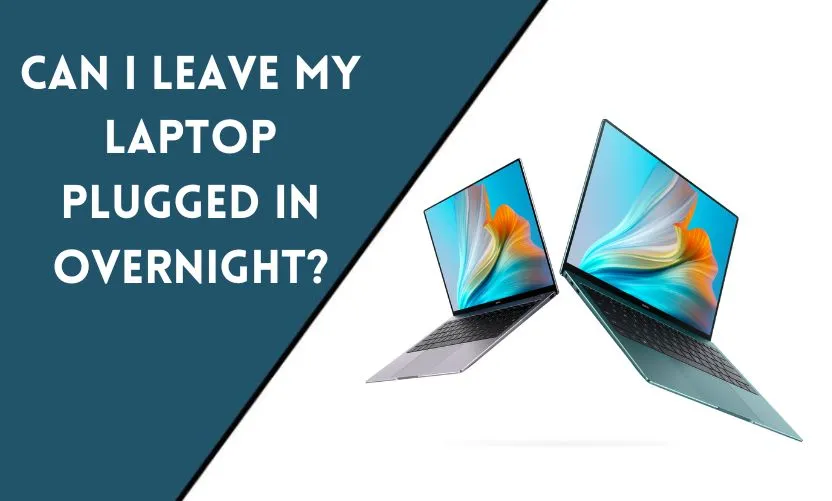
In today’s digital age, laptops have become an indispensable part of our lives. We rely on them for work, entertainment, and staying connected. It’s only natural for laptop users to ponder the question, “Can I Leave My Laptop Plugged in Overnight?” In this article, we will explore the effects of leaving a laptop plugged in for extended periods and provide valuable insights on maximizing the lifespan of your laptop’s battery.
Understanding Laptop Battery Technology
Before we delve into the topic, let’s gain a basic understanding of laptop battery technology. Most modern laptops use lithium-ion batteries, which are renowned for their energy density and rechargeability. These batteries have become the industry standard due to their ability to deliver reliable power while being relatively lightweight.
Effects of Leaving a Laptop Plugged in Overnight
Heat Generation and Battery Degradation
One concern associated with leaving a laptop plugged in overnight is the heat generated during charging. Laptops, especially when performing resource-intensive tasks, tend to heat up. Continuous charging in such conditions can lead to increased temperatures, which can have a detrimental effect on battery health and lifespan.
Overcharging and Its Impact on Battery Life
Another potential issue with leaving a laptop plugged in overnight is overcharging. In the past, overcharging used to be a significant problem as it could cause battery degradation. However, modern laptops are equipped with advanced battery management systems that prevent overcharging. These systems monitor the battery’s charge level and adjust the charging process accordingly, ensuring that the battery is not subjected to excessive voltage.
Power Surges and Electrical Safety Considerations
Leaving your laptop plugged in overnight also raises concerns about power surges and electrical safety. While power surges are rare, they can occur during thunderstorms or due to electrical faults. It’s important to use surge protectors or uninterrupted power supplies (UPS) to safeguard your laptop from potential electrical surges that can damage the device and its battery.
Modern Laptop Battery Management Systems
Fortunately, modern laptops come equipped with sophisticated battery management systems that mitigate many of the risks associated with leaving a laptop plugged in overnight.
Smart Charging Technology
Smart charging technology is a feature found in many laptops today. It allows the battery management system to adapt the charging process based on the battery’s current state and usage patterns. This technology helps optimize the charging speed and reduces the risk of overcharging.
Adaptive Charging and Battery Health
Some laptops also employ adaptive charging techniques that adjust the charging rate based on the user’s behavior. For example, if the laptop detects that the user frequently plugs in their device for short bursts, it adapts the charging process to optimize battery health.
Best Practices for Charging Your Laptop
While leaving your laptop plugged in overnight may not be as harmful as it once was, it’s still beneficial to follow some best practices to ensure the longevity of your laptop’s battery.
Unplugging When the Battery is Fully Charged
To avoid overcharging, it’s advisable to unplug your laptop once the battery reaches full capacity. Most laptops indicate this through LED indicators or software notifications. Disconnecting the charger when the battery is fully charged prevents unnecessary strain on the battery and helps maintain its overall health.
Charging in Shorter Bursts Instead of Continuous Charging
Charging your laptop in shorter bursts rather than leaving it plugged in continuously can have a positive impact on battery lifespan. Partial discharges followed by recharges help the battery exercise its capacity and prevent it from entering long periods of inactivity, which can be detrimental to its health.
Avoiding Extreme Temperature Conditions
Extreme temperature conditions, both hot and cold, can adversely affect your laptop’s battery life. It’s essential to avoid exposing your laptop to temperatures outside the recommended operating range. High temperatures can accelerate battery degradation, while low temperatures can cause temporary loss of capacity.
Tips for Maximizing Laptop Battery Lifespan
Aside from proper charging habits, there are additional tips you can follow to maximize your laptop battery’s lifespan.
Adjusting Power Settings and Optimizing Performance
Adjusting your laptop’s power settings can help optimize battery usage. Lowering the screen brightness, reducing the idle time before sleep mode, and disabling unnecessary background processes can contribute to extending battery life. Additionally, optimizing performance settings can help strike a balance between power consumption and performance requirements.
Using Battery Calibration Techniques
Periodically calibrating your laptop’s battery can improve its accuracy when estimating the remaining battery life. Most laptops come with built-in calibration tools or software that guides you through the process. Calibration helps the battery management system maintain an accurate representation of the battery’s capacity, enabling more reliable battery life predictions.
Battery Storage Guidelines for Long Periods of Inactivity
If you plan to store your laptop for an extended period, it’s important to follow proper battery storage guidelines. Ideally, the battery should be partially charged, around 50%, before storage. Additionally, the laptop should be stored in a cool, dry place to avoid exposure to extreme temperature conditions.
Conclusion
Leaving your laptop plugged in overnight is generally safe and no longer as harmful to the battery as it used to be. Modern laptops are equipped with advanced battery management systems that prevent overcharging and adapt the charging process to optimize battery health. By following best practices such as unplugging when the battery is fully charged, charging in shorter bursts, and avoiding extreme temperature conditions, you can maximize your laptop battery’s lifespan.
Frequently Asked Questions
Is it better to fully drain the laptop battery before charging?
No, it’s not necessary to fully drain your laptop battery before charging it. Lithium-ion batteries do not have a memory effect, meaning they don’t need to be fully discharged before recharging. In fact, frequent deep discharges can shorten the battery’s lifespan.
Can I use my laptop while it’s plugged in?
Yes, it’s perfectly safe to use your laptop while it’s plugged in. However, it’s important to note that using resource-intensive applications or performing tasks that put a heavy load on the laptop may generate more heat, which can impact battery health.
Should I remove the laptop battery when using it with AC power?
Most modern laptops allow you to use them with AC power while the battery is inserted. It’s generally safe to leave the battery in the laptop, but if you primarily use your laptop while connected to AC power, removing the battery can reduce heat buildup and potentially extend its lifespan.
How often should I completely discharge the battery?
Unlike older battery technologies, lithium-ion batteries do not require complete discharge cycles for maintenance. In fact, it’s better to avoid deep discharges as they can strain the battery. Instead, partial discharges and regular recharges are recommended to keep the battery healthy.
Is it safe to leave my laptop plugged in if I have a surge protector?
Using a surge protector can provide an additional layer of protection against power surges. It’s advisable to use a surge protector to safeguard your laptop and other devices connected to the same power source. However, it’s still recommended to unplug your laptop if you’re not using it for an extended period to minimize energy consumption and potential risks.










